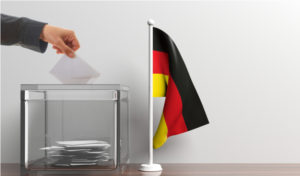
Image used under license from Shutterstock.com
After recent German elections, Angela Merkel’s Christian Democrats took the largest share of the votes, but must form a coalition with other parties to rule. The prospects for successfully forming a new government are looking worse each day. The failure to create an orderly government in Germany is increasing perceived risk in Europe, and if things are settled in Germany soon, it may cause turmoil as the continent’s most stable nation becomes less so. The cause of Merkel’s current predicament is her acceptance of one million refugees, a plan that directly strengthened her competitors. Jacob Heilbrunn writes in The National Interest:
One of the principal reasons that Germany has seen the return of the FDP and the rise of the AfD, however, is because the Christian Democrats under Merkel have steadily moved toward the center, much to the agony of the Christian Social Union, the Bavarian partner party of the CDU. Like Konrad Adenauer, the first chancellor of West Germany, Merkel’s motto, more or less, has been “Keine Experimente!,” or “no experiments.” It was Merkel who put the kibosh on nuclear energy after the accident in Fukushima, Japan. She also welcomed refugees from the Middle East, a move that has almost singlehandedly helped to create a viable new party on the right, the Alternative for Germany or AfD.
The AfD began as a fairly sober party that was focused on what its leaders saw as the catastrophic financial consequences for Germany of the Euro. It championed a restoration of the venerable deutsche mark. Since then the party, as Thomas Meaney has written in these pages, has drifted steadily toward the populist right, largely boosted by Merkel’s self-confessed immigration blunder in 2015.
Read more here.
If you’re willing to fight for Main Street America, click here to sign up for my free weekly email.





